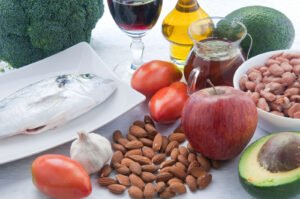10 Best Foods For Lowering Cholesterol

High cholesterol is a common health problem that can increase the risk of heart disease and stroke. Fortunately, there are many foods that can help lower cholesterol levels. Here are ten of the best foods for lowering cholesterol:
- Oats: Oats are rich in soluble fiber, which can help lower LDL (bad) cholesterol levels by reducing the absorption of cholesterol in the bloodstream.
- Nuts: Nuts, such as almonds, walnuts, and cashews, are rich in healthy fats, fiber, and plant sterols, which can help lower LDL cholesterol levels.
- Fatty fish: Fatty fish, such as salmon, tuna, and mackerel, are rich in omega-3 fatty acids, which can help lower LDL cholesterol levels and improve heart health.
- Avocados: Avocados are rich in healthy fats and fiber, which can help lower LDL cholesterol levels and improve overall heart health.
- Beans: Beans, such as kidney beans, black beans, and chickpeas, are rich in soluble fiber, which can help lower LDL cholesterol levels.
- Garlic: Garlic contains compounds that can help lower LDL cholesterol levels and improve heart health.
- Dark chocolate: Dark chocolate is rich in flavonoids, which have been shown to help lower LDL cholesterol levels.
- Olive oil: Olive oil is rich in healthy monounsaturated and polyunsaturated fats, which can help lower LDL cholesterol levels and improve overall heart health.
- Fruits: Fruits, such as apples, grapes, and strawberries, are rich in fiber and antioxidants, which can help lower LDL cholesterol levels.
- Vegetables: Vegetables, such as broccoli, spinach, and kale, are rich in fiber and antioxidants, which can help lower LDL cholesterol levels.
In conclusion, incorporating these ten foods into your diet can help lower cholesterol levels and improve overall heart health. A healthy diet that is rich in fruits, vegetables, whole grains, and lean proteins, and low in processed and high-fat foods, can also help reduce the risk of high cholesterol and other chronic diseases. Additionally, it’s important to talk to a healthcare professional about any dietary changes, especially if you have a pre-existing health condition.

Comments